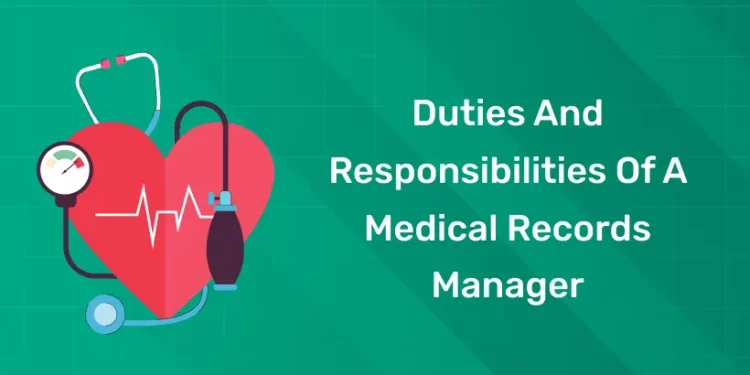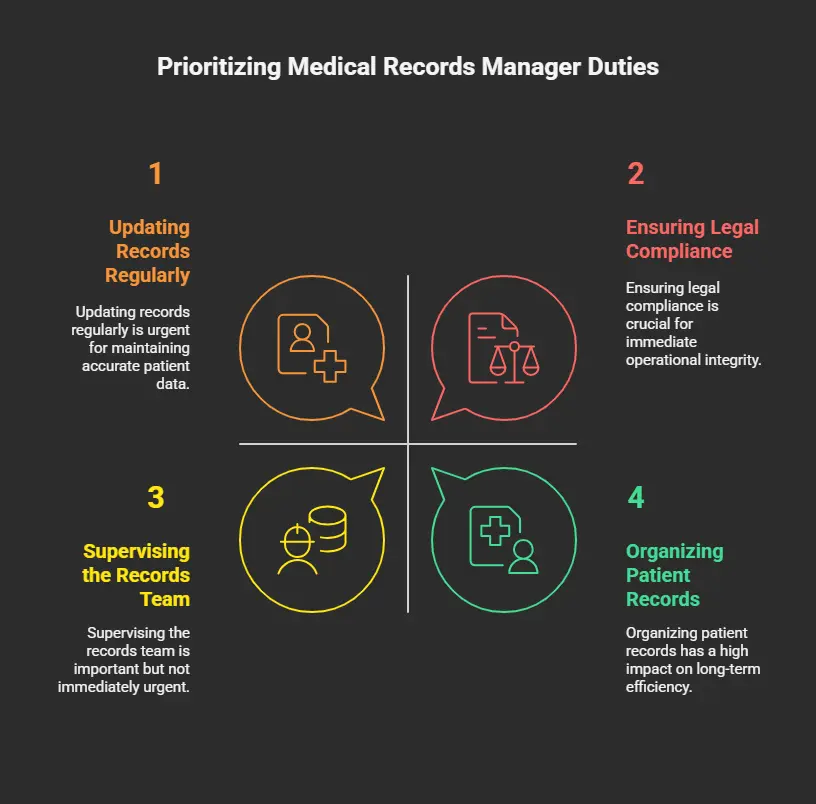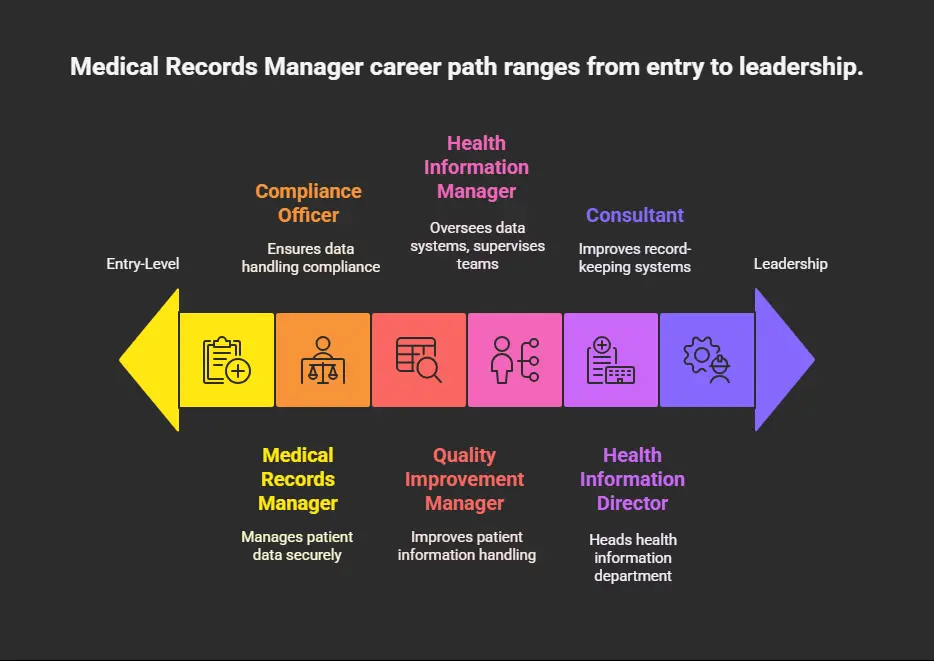Table of Contents
Safeguarding and managing sensitive documents is a priority in every hospital and clinic. This is where a Medical Records Manager comes into play. They manage all the medical record files as well as reports related to patients’ health data within the healthcare institution. Their role ensures data is accessible, which supports accurate patient care by doctors and nurses. In this article, we will discuss the daily activities of a Medical Records Manager and highlight why their role has a significant impact in the healthcare sector
Explore Your Future in Hospital Administration! Enroll now
Introduction
A medical record manager is a person who is responsible for maintaining of all patient files and health records. They ensure that the information is correct, updated and kept confidential. They help doctors and nurses find patient details quickly when needed. Without this well-structured role, it would be difficult for the health teams to take things. That’s why this role is so important in any healthcare.
Key Duties of a Medical Records Manager
The position of Medical Records Manager is quite relevant in both hospitals and clinics. They help ensure that records containing sensitive patient health information are monitored systematically for precision and safety. Such works help doctors, nurses, and other health care providers attend to the patients in a more efficient manner.
1. Organizing Patient Records
- For each patient, they gather files containing test results, treatment histories, doctor’s notes as well as any relevant reports into structured systems.
- All files are stored digitally or physically so that retrieval is efficient within the organization when they are needed.
- It is ensured that all patients have complete files and documents at hand to provide the best care possible.
2. Maintaining Privacy and Security
- A patient’s information is sensitive. Medical Records Managers guarantee it is well guarded, ensures confidentiality, and maintains strict access controls.
- They follow rules like HIPAA (in some countries) or local privacy laws to safeguard the information.
3. Updating Records Regularly
- Every time a patient goes to the hospital, the background info part of their record must be updated with information pertinent to their situation.
- The manager does accuracy checks both for missing details and wrong details and corrects them promptly within about one business day.
4. Using Health Information Systems (HIS)
-
Most hospitals now use computers instead of paper files.
-
Medical Records Managers use special hospital software to store, track, and manage records.
-
They also help train staff to use the system correctly.
5. Managing Medical Coding and Billing Support
-
They help make sure that medical codes are used correctly. These codes are used to explain a patient’s illness and treatment in numbers.
-
This helps the billing team charge patients and insurance companies properly.
-
If there are any coding errors, the manager works with the billing or coding staff to fix them.
6. Preparing Reports for Management
-
Medical Records Managers create reports for hospital management, showing:
-
How many patients were treated
-
Types of illnesses or procedures
-
Staff performance in handling records
-
-
These reports help the hospital make better decisions.
7. Ensuring Legal Compliance
-
Hospitals must follow certain rules when keeping patient records.
-
The Medical Records Manager checks that the hospital follows all laws and rules related to data storage and record-keeping.
-
If rules change, they update the system and train staff on the new process.
8. Supervising the Records Team
-
They often manage a team of records clerks, data entry workers, and file handlers.
-
They assign work, solve problems, and make sure the team is working well.
-
They also train new staff to handle medical records properly.
9. Helping Doctors and Nurses
-
When doctors or nurses need a patient’s record quickly, the manager helps them find it.
-
They also explain how to access or update files correctly.
-
If there are any issues with missing or locked records, the manager solves them.
10. Backing Up and Archiving Records
-
They create digital backups of all patient records so that nothing is lost during a power cut or computer crash.
-
Old records are stored safely in archives for future use or legal needs.
Core Responsibilities in Day-to-Day Operations
As a Medical Records Manager, assistants collect and maintain structured files with the highest possible levels of order, security, organization, and retrievability. They support other employees with tasks; assist in confidential error checking; uphold confidentiality standards; and data storage compliance procedures. All these activities align towards judiciously managing resources to improve care outcomes.
1. Reviewing and Updating Patient Records
-
Every day, new patients come in and old patients get updates to their treatment.
-
The Medical Records Manager checks all files to make sure the latest reports, test results, and doctor notes are added.
-
If anything is missing or incorrect, they correct it right away.
2. Managing Electronic Health Records (EHR)
-
Most hospitals now use computers to store patient data.
-
The manager works with Electronic Health Records (EHR) systems to keep files organized.
-
They make sure all information is entered correctly and saved securely.
3. Ensuring Data Privacy and Safety
-
Patient records are private and should be protected.
-
The manager controls who can see or update the files.
-
They also make sure no one without permission can access patient information.
4. Helping Doctors, Nurses, and Staff
-
If a doctor needs a file or a nurse can’t find a report, the manager helps them quickly.
-
They respond to staff requests for files, updates, or patient history.
-
They also train staff on how to use the record systems properly.
5. Supervising the Records Team
-
If the hospital has a team of people working with files, the manager leads them.
-
They assign tasks, answer questions, and check that work is done correctly.
-
They also support new staff by teaching them how to manage records.
6. Handling Record Requests
-
Patients or outside doctors may ask for medical records.
-
The manager checks if the request is valid and then provides the correct information.
-
They make sure the process follows hospital rules and privacy laws.
7. Backing Up Files
-
To prevent data loss, the manager backs up all files regularly.
-
They may store copies on external drives or secure cloud storage.
-
This protects patient data in case of power cuts or system crashes.
8. Tracking Record Storage and Retrieval
-
Some records are stored for years, especially those of serious illnesses or surgeries.
-
The manager keeps a system to track where files are stored and when they can be removed or archived.
-
This helps avoid confusion and keeps space organized.
9. Checking for Errors
-
Every day, the manager checks for mistakes in patient files—wrong dates, missing names, or unclear notes.
-
They fix these errors to keep the records clean and accurate.
10. Reporting to Hospital Management
-
The manager may share daily or weekly updates with hospital leaders.
- These reports show how many records were updated, any issues found, or how well the team is performing.
Explore Your Future in Hospital Administration! Enroll now
Skills and Qualifications Required
To be a Medical Records Manager, one has to have proper training, education as well as requisite competencies in order to be considered successful. One must grasp management strategies as they include handling medical documents such as filing them while ensuring privacy protocols along with functioning health information systems—as knowing things is important here but practicing responsibility also matters.
1. Educational Qualifications
To start a career in medical records management, you usually need:
✔️ A Bachelor’s Degree
Most employers require a bachelor’s degree in:
-
Health Information Management (HIM)
-
Healthcare Administration
-
Medical Records Technology
-
Health Informatics
These programs teach you how to manage patient data, understand medical terminology, and work with health record systems.
✔️ Optional: Master’s Degree
Some professionals go further by earning a master’s degree in Healthcare Administration (MHA) or Public Health. This can help you qualify for leadership roles in larger hospitals or healthcare networks.
✔️ Certifications (Highly Recommended)
Earning a certification shows your expertise and can improve job opportunities. Some common ones include:
-
Registered Health Information Administrator (RHIA)
-
Certified Health Data Analyst (CHDA)
-
Certified Professional in Health Informatics (CPHI)
These certifications are often offered by health information associations like AHIMA (U.S.-based) or local health councils.
2. Technical and Professional Skills
A Medical Records Manager should have several key skills to perform the job effectively:
🖥️ Computer and Software Skills
You must know how to use Electronic Health Record (EHR) systems and other medical software. Basic computer skills like typing, data entry, and using Excel or hospital databases are very important.
📂 Data Organization
You should be good at sorting, filing, and managing information. Whether records are in digital or paper form, they must be easy to find and properly stored.
🔒 Knowledge of Privacy Laws
You need to understand laws such as HIPAA in the U.S concerning patient privacy or data protection regulations from your country. Helps in safeguarding privacy by ensuring patients records are protected and only accessible by authorized personnel.
3. Soft Skills
In addition to education and technical skills, you need strong soft skills to manage people, work with hospital staff, and handle daily tasks smoothly:
🗣️ Communication Skills
Regular interactions through conversations will be with doctors, nurses, administrative personnel, sometimes even patients. Conveying information diplomatically is pertinent to accessing assistance and addressing issues.
⏱️ Time Management
You will have many tasks to do each day—like checking records, answering requests, and preparing reports. Good time management helps you stay organized and meet deadlines.
🧠 Attention to Detail
Assuring accuracy remains critical when capturing or reviewing because record details entering altered no matter how microscopic can prove harmful .
👥 Leadership and Teamwork
If you’re managing a records department, you must guide and support your team. Being a good leader means helping others do their best work while also working well with different departments.
Career Opportunities and Growth
Having such a title presents the individual with an attractive professional option owing to its relative security alongside ample opportunity for advancement and growth. As these institutions undergo improvements within their operational frameworks-focusing on automation-the need of skilled specialists becomes apparent thus motivating exploration into this career path alongside its anticipated growth trends.
1. Job opportunities in different places
Medical Records Managers can find jobs in many types of healthcare settings, such as:
-
Hospitals
-
Private Clinics
-
Nursing Homes
-
Rehabilitation Centers
-
Diagnostic Labs
-
Health Insurance Companies
-
Government Health Departments
-
Telehealth & Digital Health Companies
2. Roles you can grow into
With experience, Medical Records Managers can move into higher positions like:
-
Health Information Manager: (Oversees larger data systems and supervises teams.)
-
Health Information Director: (Heads the health information department in a hospital.)
-
Compliance Officer: (Ensures the hospital follows rules and laws about patient data.)
-
Quality Improvement Manager: (Monitors and improves how patient information is handled.)
-
Consultant for Healthcare Technology Firms: (Helps clinics improve or install record-keeping systems.)
3. Learning and certifications help you grow
To grow in this career, continuing to learn is very helpful.
-
Take any online courses like, medical coding, data privacy, or health IT.
-
Get certified by professional health information bodies (e.g.,RHIA or CHDA).
-
Attend workshops and conferences if possible to stay updated with the latest health information systems.
4. Demand is growing
Nowadays, many hospitals and clinics are going digital. With increasing focus on data privacy, digital health records, and patient safety, the demand for skilled Medical Records Managers is going steadily. Especially in countries like India, the UAE, the UK, and the USA, the healthcare sector is expanding rapidly, creating more job openings for trained professionals.
5. Freelance and Remote Options
Flexibility makes it easy to balance work and life, especially for those who prefer remote jobs.
-
Remotely (from home)
-
As freelancers or consultants for small clinics or private doctors
-
For medical billing and coding companies
Explore Your Future in Hospital Administration! Enroll now
Conclusion
1: What is the primary role of a hospital administrator?
A Medical Records Manager plays a very important role in any hospital or clinic. They ensure that patient records are accurate, secure, and accessible. Their efforts enable doctors and nurses to provide quality care to patients.
With proper education, skills and training, you can build a successful career in the field. There are many job opportunities, which are likely to grow, and even there are opportunities to work from home. If you are organized, responsible and care about helping people, it may be the right thing for you.
Hospital Administration Course with Assured Career Growth
Hospital Administration Course by Entri App: Master essential healthcare management skills, gain certification, and secure top roles in leading hospitals
Join Now!Frequently Asked Questions
What does a Medical Records Manager do every day?
A Medical Records Manager is responsible for collecting, storing, updating, and securing patient health records. On a daily basis, they review patient files, ensure all medical reports and doctor notes are properly added, and check that the information is complete and correct. They also respond to record requests from doctors, nurses, and sometimes patients. If a patient visits the hospital, the manager ensures their medical record reflects all recent tests, treatments, and reports.
How does a Medical Records Manager protect patient privacy?
Protecting patient privacy is one of the most important duties of a Medical Records Manager. They make sure that only authorized staff can see or update a patient’s records. They follow privacy laws like HIPAA (in the U.S.) or local data protection rules. They set passwords, limit access, and train staff to follow the correct privacy procedures. If there’s a mistake or a security risk, the manager takes immediate action to fix it and report it.
What software or tools does a Medical Records Manager use?
Most Medical Records Managers use Electronic Health Record (EHR) systems to manage patient data. These systems store everything from personal details and lab results to treatment history and discharge notes. Popular software may include:
-
Epic
-
Cerner
-
Meditech
-
Allscripts
They also use basic office software like Microsoft Excel, Outlook, and document scanners. The manager may also oversee data backup systems to make sure records are not lost due to technical issues.
Do Medical Records Managers handle medical billing or insurance work?
While they do not do the actual billing, Medical Records Managers often work closely with the billing and coding team. They help ensure that patient records are coded correctly using standard medical codes (like ICD-10 or CPT). These codes are used by insurance companies for claims. If there’s an error in a patient’s code or record, the manager works with the billing department to fix it, so payments are not delayed.
What role does a Medical Records Manager play in supporting hospital staff?
Medical Records Managers support hospital staff by ensuring quick and accurate access to patient files. If a doctor needs to review a patient’s previous treatments before making a diagnosis, the manager ensures that the file is up to date and easy to find. They also assist nurses and admin staff by explaining how to use the hospital’s record system. Their role helps reduce delays and errors in patient care.
Can a Medical Records Manager supervise other staff?
Yes, in larger hospitals or clinics, a Medical Records Manager may lead a team of health records technicians, data entry clerks, or file room staff. They assign duties, provide training, solve issues, and ensure the team follows all procedures properly. As a supervisor, they make sure everything runs smoothly and records are handled with care and accuracy.













